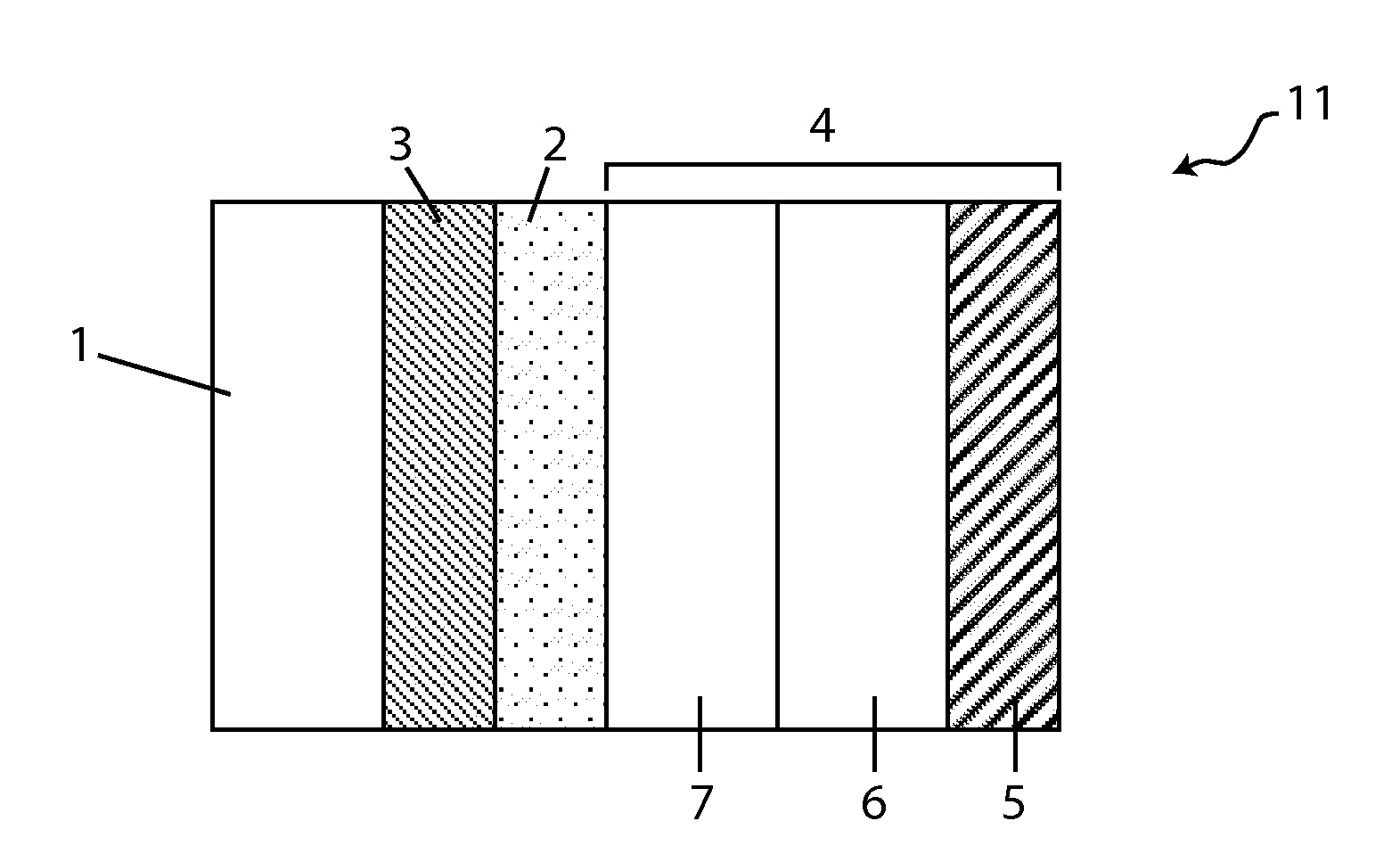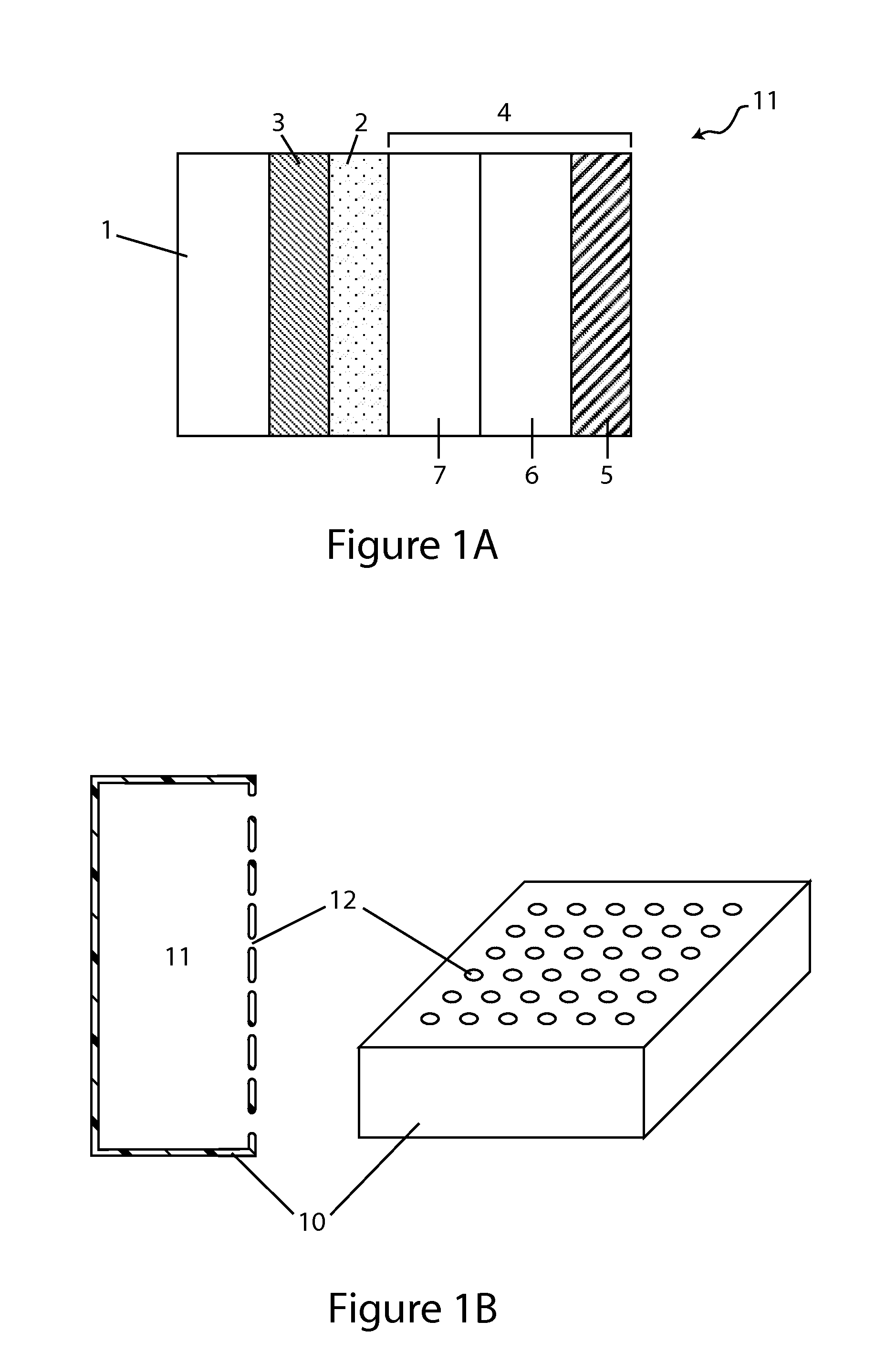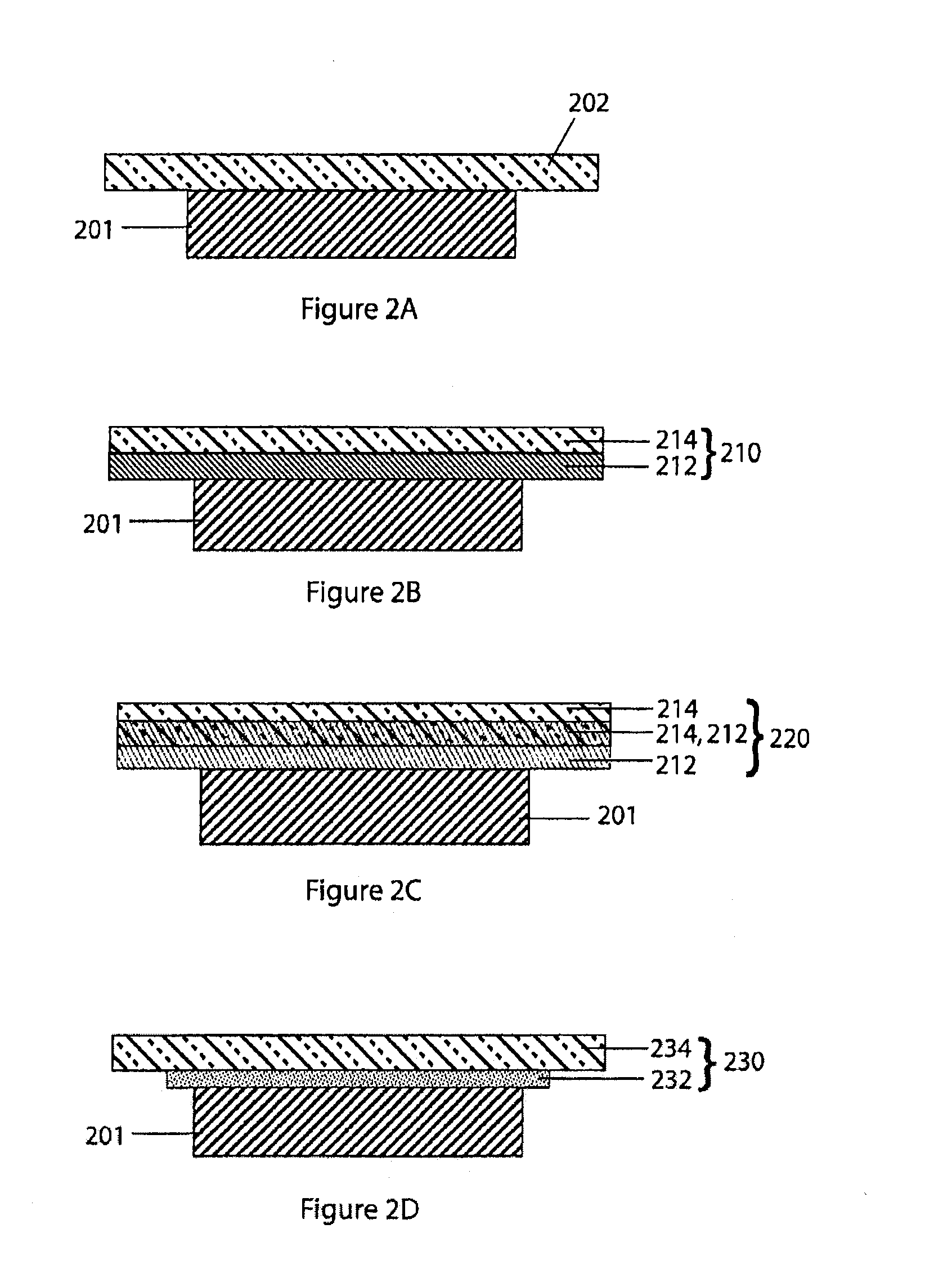Catholytes for aqueous lithium/air battery cells
a lithium-air battery and catholyte technology, applied in the field of active metal electrochemical devices, can solve the problems of incompatible aqueous electrolytes, negative electrode corrosion, and lithium reactive alkali metal, and achieve the effect of enhancing or maintaining the conductivity of the catholy
Active Publication Date: 2013-05-16
POLYPLUS BATTERY CO INC
View PDF0 Cites 59 Cited by
- Summary
- Abstract
- Description
- Claims
- Application Information
AI Technical Summary
Benefits of technology
[0012]In accordance with Li / air cells of the current invention and the above aspect, in various embodiments active species dissolved in the catholyte partake in the cell reaction, and discharge products form that render the cathode compartment hygroscopic. By this expedient, the cathode compartment scavenges water from the ambient air during cell operation, and this facilitates a number of advantages, including: preventing dry out of the catholyte, prolonging the discharge, and enhancing the cell energy density (Wh / kg and Wh / l).
[0015]Appropriate concentrations of active and non-active salts may impart a number of benefits to the cell, including: i) rendering the cathode compartment hygroscopic during cell operation; ii) effectuating, prior to initial discharge, a very low vapor pressure of water above the catholyte; iii) enhancing or maintaining the conductivity of the catholyte at various stages of discharge, and iv) stabilizing the protective membrane / catholyte interface during storage under open circuit conditions.
[0022]In various embodiments, the discharge product, hygroscopic, may be used to facilitate water management in the cathode compartment, including preventing catholyte dry out. Moreover, in various embodiments, the absorptive capacity of the cathode compartment enables the cells of the instant invention to be manufactured with less water than that which is necessary for the cell to deliver its rated capacity. In accordance with these embodiments, the cell, initially having an insufficient amount of water, absorbs the necessary amount of water from the ambient air during cell operation.
[0024]In yet another aspect, the invention provides a Li / air cell comprising a hydrogel or a hydrogel layer which may be utilized to great advantage in the cell, including improving specific energy of the cell by allowing a high loading of active and supporting electrolyte salts, both of which may be dissolved in the catholyte or present in the form of un-dissolved solids (e.g., active solid phase salts and solid supporting salt (e.g., lithium salts including LiCl, LiBr and LiI). In various embodiments, the hydrogels are disposed in the cathode compartment between the anode and the cathode, and their swelling properties make them particularly suitable for retaining large amounts of water absorbed by the catholyte during discharge, and by this expedient preventing catholyte leakage.
[0031]In various embodiments, the catholyte, prior to initial discharge, comprises more than one dissolved salt. For instance, the catholyte may comprise more than one active salt, or a combination of active salts and non-active salts (e.g., lithium salts). Or the catholyte may comprise two or more active salts and, optionally, at least one supporting electrolyte salt dissolved therein. In a specific embodiment the catholyte comprises two different lithium salts: a first lithium salt (LiCl) which is very hygroscopic and soluble and a second lithium salt (LiBr) that while significantly heavier than the first salt is extremely hygroscopic and so its facility to drive water absorption into the compartment offsets the additional weight of its anion, and the combined salt system is an effective mechanism for balancing these effects.
Problems solved by technology
However, Li / air chemistry introduces some rather unique challenges.
Lithium is a reactive alkali metal and is incompatible with aqueous electrolytes.
Corrosion of the negative electrode due to reaction of the metal anode with water and oxygen in aqueous electrolyte is clearly a much more serious issue for lithium than it is for zinc.
Method used
the structure of the environmentally friendly knitted fabric provided by the present invention; figure 2 Flow chart of the yarn wrapping machine for environmentally friendly knitted fabrics and storage devices; image 3 Is the parameter map of the yarn covering machine
View moreImage
Smart Image Click on the blue labels to locate them in the text.
Smart ImageViewing Examples
Examples
Experimental program
Comparison scheme
Effect test
example 1
[0169]FIG. 3 illustrates performance of a Li / Air cell having 4M NH4Cl, 2M LiCl catholyte and zirconia felt reservoir layers.
example 2
[0170]FIG. 4 illustrates performance of a Li / Air cell having 4M NH4Cl, 2M LiCl catholyte and graphite felt reservoir layers.
example 3
[0171]FIG. 5 illustrates stability of a solid electrolyte protective membrane in contact with 4M NH4Cl, 2M LiCl catholyte during long-term storage.
the structure of the environmentally friendly knitted fabric provided by the present invention; figure 2 Flow chart of the yarn wrapping machine for environmentally friendly knitted fabrics and storage devices; image 3 Is the parameter map of the yarn covering machine
Login to View More PUM
| Property | Measurement | Unit |
|---|---|---|
| equilibrium relative humidity | aaaaa | aaaaa |
| equilibrium relative humidity | aaaaa | aaaaa |
| equilibrium relative humidity | aaaaa | aaaaa |
Login to View More
Abstract
Li / air battery cells are configurable to achieve very high energy density. The cells include a protected a lithium metal or alloy anode and an aqueous catholyte in a cathode compartment. In addition to the aqueous catholyte, components of the cathode compartment include an air cathode (e.g., oxygen electrode) and a variety of other possible elements.
Description
CROSS-REFERENCE TO RELATED APPLICATIONS[0001]This application is a continuation of U.S. patent application Ser. No. 12 / 484,063 filed Jun. 12, 2009, titled CATHOLYTES FOR AQUEOUS LITHIUM / AIR BATTERY CELLS; which claims priority to U.S. Provisional Patent Application No. 61 / 159,786 filed Mar. 12, 2009, titled HIGH ENERGY DENSITY AQUEOUS LITHIUM / AIR CELLS; and U.S. Provisional Patent Application No. 61 / 078,294 filed Jul. 3, 2008, titled AQUEOUS LI / AIR CELLS; and U.S. Provisional Patent Application No. 61 / 061,972 filed Jun. 16, 2008, titled AQUEOUS LI / AIR CELLS. Each of these prior applications is incorporated herein by reference in its entirety and for all purposes.[0002]This application is a continuation of U.S. patent application Ser. No. 12 / 484,065 filed Jun. 12, 2009, titled HIGH ENERGY DENSITY AQUEOUS LITHIUM / AIR BATTERY CELLS. This prior application is incorporated herein by reference in its entirety and for all purposes.[0003]This application is a continuation of U.S. patent app...
Claims
the structure of the environmentally friendly knitted fabric provided by the present invention; figure 2 Flow chart of the yarn wrapping machine for environmentally friendly knitted fabrics and storage devices; image 3 Is the parameter map of the yarn covering machine
Login to View More Application Information
Patent Timeline
 Login to View More
Login to View More Patent Type & Authority Applications(United States)
IPC IPC(8): H01M12/06
CPCH01M2/1673H01M4/382H01M6/04H01M6/045Y10T29/49108H01M12/06H01M8/08H01M12/02H01M12/04H01M50/46Y02E60/50Y02P70/50H01M4/02
Inventor VISCO, STEVEN J.DE JONGHE, LUTGARD C.NIMON, YEVGENIY S.PETROV, ALEXEIPRIDATKO, KIRILL
Owner POLYPLUS BATTERY CO INC
Features
- R&D
- Intellectual Property
- Life Sciences
- Materials
- Tech Scout
Why Patsnap Eureka
- Unparalleled Data Quality
- Higher Quality Content
- 60% Fewer Hallucinations
Social media
Patsnap Eureka Blog
Learn More Browse by: Latest US Patents, China's latest patents, Technical Efficacy Thesaurus, Application Domain, Technology Topic, Popular Technical Reports.
© 2025 PatSnap. All rights reserved.Legal|Privacy policy|Modern Slavery Act Transparency Statement|Sitemap|About US| Contact US: help@patsnap.com



